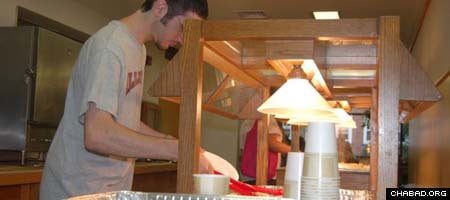The other night, a group of about 100 Jewish students were enjoying their dinner in the University of Illinois at Urbana-Champaign's Allen Hall dining area, when another came bursting through the doors screaming, "Yea! Kosher!"
He wasn't the only one excited: After much effort to get a kosher dinner plan for the predominantly Jewish dorm, a newly worked out agreement has the cafeteria providing kosher meals Monday through Thursday.
The meal plan came about through the efforts of Rabbi Dovid Tiechtel, co-director with wife Pearl Tiechtel of the university's Chabad Center for Jewish Student Life. After watching Jewish students deal with the frustrations of keeping kosher in their dorm rooms, the rabbi set out to work with the school's administration to explore other possibilities.
"We've been working towards this goal for a few years," said Tiechtel, who after many meetings with the university's Department of Student Affairs, supervised a trial program last year that gave students the option of buying kosher dinners twice a month.
"The trial attracted crowds of Jewish students," he related. "The school saw a big turnout, and appreciated the need."
Renee Romano, the university's vice chancellor, said that the lion's share of the burden is on Tiechtel, who koshered a small kitchen off of the dining hall and likewise ensures that everything be done in accordance with Jewish dietary laws.
"It's difficult, because the food must be kept separate" from the non-kosher food also served, said Romano. "Luckily, Rabbi Tiechtel has been willing to work with us."
To supplement the meal plan, students can also buy prepackaged, frozen kosher meals to heat up in their rooms.
"We've been talking to students and their preferences," said Romano. "And they know we're working hard to provide as many kosher meals as possible."
Spurring Conversation

"An essential thing about Judaism is expressing your identity wherever you are, in everything that you do," he explained. "Kosher is not just for the synagogue, or on the holidays, but for our dorms. Wherever we go, we should be openly proud of who we are. And what we eat is a big part of that."
When Robbie Phillips, 19, heard about the meal plan, he was surprised.
"Kosher food in a public university? I never thought that it was possible," he said. Before the food plan, "I was living out of a microwave."
To be sure, some public universities offer kosher dining options to their students, but far less than the number of schools with sizable Jewish student populations.
But in today's world, Romano explained, universities are actively seeking out ways they can accommodate their student bodies' mix of religious and cultural groups.
"It's always been my interest to provide as many kosher meals as possible," she said. "It is important, because we need to stop thinking and making decisions as if everyone has [the same] background and belief system."
Aside for the obvious improvement in food, Phillips pointed to some other meaningful changes since the program started.
"Everyone's Jewish pride has gone up," he said. "Before, my non-Jewish friends just knew that I couldn't eat with them. Now that they see our meal plan, it's real to them, not just something abstract."
The student added that he saw the meals as providing an opportunity for Jews on campus to engage their non-Jewish friends in meaningful dialogue.
"We're using the new meal plan to let people know what kosher is. A lot of people don't know anything about it," he elaborated. "The students here are all more connected and aware now."
Music and education student Allison Zabelin, 20, agreed.
'I've had a lot of conversations with people about what kosher is," she said. "There's a lot more awareness."
Zaeblin, who admitted that she's not strictly kosher observant, will not eat non-kosher meat. Prior to the advent of the meal plan, the meat-lover was left with no other option but to proclaim herself a vegetarian.
"Now that the school serves kosher meat meals, I'm done with being a vegetarian," she said. "It's great to be able to eat meat now."
Tiechtel said that he's received a lot of positive feedback.
"I have parents calling me to say that their child is happier in school because she's eating now," he said. "And then I have Jewish students who see that it's possible to keep kosher. I can't tell you enough about the excitement among the students."










Start a Discussion